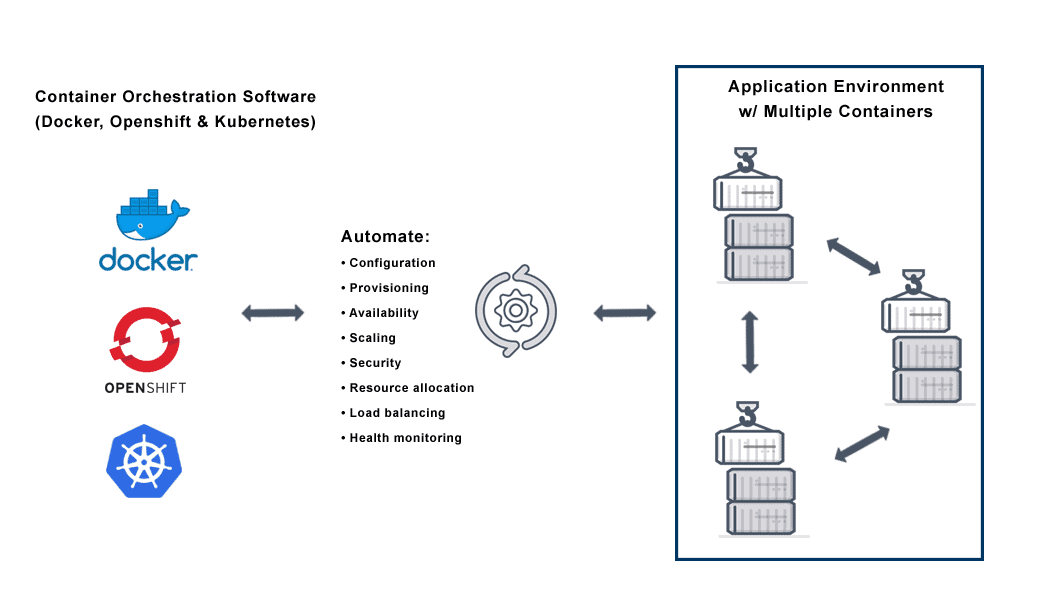Container Orchestration Definition
Container orchestration is the automatic process of managing or scheduling the work of individual containers for applications based on microservices within multiple clusters. The widely deployed container orchestration platforms are based on open-source versions like Kubernetes, Docker Swarm or the commercial version from Red Hat OpenShift.

What is Container Orchestration?
Container orchestration is the automation of all aspects of coordinating and managing containers. Container orchestration is focused on managing the life cycle of containers and their dynamic environments.
Why Do We Need Container Orchestration?
Container orchestration is used to automate the following tasks at scale:
• Configuring and scheduling of containers
• Provisioning and deployments of containers
• Availability of containers
• The configuration of applications in terms of the containers that they run in
• Scaling of containers to equally balance application workloads across infrastructure
• Allocation of resources between containers
• Load balancing, traffic routing and service discovery of containers
• Health monitoring of containers
• Securing the interactions between containers.
How Does Container Orchestration Work?
Container orchestration works with tools like Kubernetes and Docker Swarm. Configurations files tell the container orchestration tool how to network between containers and where to store logs. The orchestration tool also schedules deployment of containers into clusters and determines the best host for the container. After a host is decided, the orchestration tool manages the lifecycle of the container based on predetermined specifications. Container orchestration tools work in any environment that runs containers.
Orchestration tools for Docker include the following:
• Docker Machine — Provisions hosts and installs Docker Engine.
• Docker Swarm — Clusters multiple Docker hosts under a single host. It can also integrate with any tool that works with a single Docker host.
• Docker Compose — Deploys multi-container applications by creating the required containers.
Orchestration tools for Kubernetes include the following features:
• Automated deployment and replication of containers.
• Online scale-in or scale-out of container clusters.
• Load balancing groups of containers.
• Automated rescheduling of failed containers.
• Controlled exposure of network ports to systems outside of the cluster.
Docker Container Orchestration vs. Kubernetes Container Orchestration
The Docker container orchestration tool, also known as Docker Swarm, can package and run applications as containers, find existing container images from others, and deploy a container on a laptop, server or cloud (public cloud or private). Docker container orchestration requires one of the simplest configurations.
Orchestration in container services for Kubernetes allows container clustering via a container orchestration engine. Kubernetes has declarative management that hides complexity, and is open source so you can run it anywhere.
Benefits of Containerized Orchestration Tools
• Increased portability — Scale applications with a single command and only scale specific functions without affecting the entire application.
• Simple and fast deployment — Quickly create new containerized applications to address growing traffic.
• Enhanced productivity — Simplified installation process and decreased dependency errors.
• Improved security — Share specific resources without risking internal or external security. Application isolation improves web application security by separating each application’s process into different containers.
Does VMware NSX Advanced Load Balancer Integrate with Container Orchestration?
The VMware NSX Advanced Load Balancer provides a centrally orchestrated, ingress gateway for containers composed of a fabric of proxy services with dynamic load balancing, service discovery, security, micro-segmentation, and analytics for container-based applications running in OpenShift and Kubernetes environments.
The VMware NSX Advanced Load Balancer delivers a scalable, enterprise-class Container Ingress to deploy and manage business-critical workloads in production environments using Redhat container orchestration with OpenShift and Kubernetes clusters.
For more on the actual implementation of load balancers, check out our Application Delivery How-To Videos.
For more information on container orchestration see the following resources: